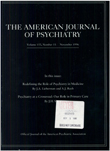Effects of informant mental disorder on psychiatric family history data
Abstract
OBJECTIVE: In family history interviews, mentally ill individuals ascribe their own disorders to relatives more frequently than informants who are not ill. Whether this reflects increased or decreased reporting accuracy remains unknown. This study addressed this issue by examining the sensitivity and specificity of diagnoses based on information from different types of informants classified by their own illness status. METHOD: Both members of 2,193 pairs of individuals participating in a psychiatric family study were directly interviewed. One individual in each pair (the informant) also provided family history data about the other (the subject). Informant-subject pairs were grouped according to the illness status of the informant based on the direct interview. Patterns of ascription of mental illness to subjects by groups of ill and not-ill informants were then compared with the subjects' psychiatric status based on direct interview. RESULTS: For depression, alcoholism, panic disorder, and "any diagnosis," ill informants demonstrated significantly increased sensitivity in family history reports when compared to never-mentally- ill informants; specificity, by contrast, was always significantly reduced. For each disorder, the aggregate disorder rate derived from family history reports was closer to the rate derived from direct interviews if information from ill informants as a group was used. CONCLUSIONS: The sensitivity and specificity of family history information appears to vary systematically with informant mental illness status. This may introduce a serious bias into psychiatric family study data, leading to overestimation of the strength of the tendency for mental disorders to "run in families." Family studies that rely on the informant method in their diagnostic evaluations should be aware of this problem.
Access content
To read the fulltext, please use one of the options below to sign in or purchase access.- Personal login
- Institutional Login
- Sign in via OpenAthens
- Register for access
-
Please login/register if you wish to pair your device and check access availability.
Not a subscriber?
PsychiatryOnline subscription options offer access to the DSM-5 library, books, journals, CME, and patient resources. This all-in-one virtual library provides psychiatrists and mental health professionals with key resources for diagnosis, treatment, research, and professional development.
Need more help? PsychiatryOnline Customer Service may be reached by emailing [email protected] or by calling 800-368-5777 (in the U.S.) or 703-907-7322 (outside the U.S.).



